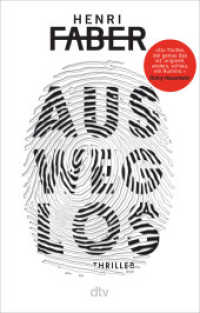基本説明
Explores the difficult process of translation between two fields, drawing on three different scholarly perspectives - the 'insider' approach which views social science as a tool that lawyers can use for legal ends, the 'outsider' approach of the law and society or sociology of law movement, and the study of the language of law.
Full Description
The legal system relies on social science for answers to many tough questions. Social scientists study issues relevant to law. But are law and social science talking past one another? This collection of important articles and essays explores the difficult process of translation between these two fields, drawing on three different scholarly perspectives - the 'insider' approach which views social science as a tool that lawyers can use for legal ends, the 'outsider' approach of the law and society or sociology of law movement, and the study of the language of law. Each section of the volume combines theoretical articles with specific empirical examples, ranging from the death penalty through anti-discrimination law to family violence.
Contents
Contents: Series preface; Introduction; Part I Problematizing and Analyzing Translation: The Transparency Myth: The Transparency Myth: Translation or Transformation?: Intellectual integration, James Boyd White; Judicial use of social science research, John Monahan and Laurens Walker. Translation Problems and the Death Penalty: Uses and abuses of empirical evidence in the death penalty debate, John Donahue and Justin Wolfers; The changing nature of the death penalty debates, Michael L. Radelet and Marian J. Borg; The death penalty dialogue between law and social science, David C. Baldus. Part II Translating Social Science in Legal Settings: Across Divergent Frames: Teaching lawyers the language of law: legal and anthropological translations, Elizabeth Mertz; Can Law learn from social science?, David Nelken; Law and the methodology of law, Edward L. Rubin; Legal perceptions of science and expert knowledge, Joseph Sanders, Shari S. Diamond and Neil Vidmar. Discrimination in the Civil Law Context: Jurisprudence, Edmond Cahn; The future of Bakke: will social science matter?, Deborah Jones Merritt; Social science research on trial: use of sex stereotyping research in Price Waterhouse v. Hopkins, Susan T. Fiske, Donald N. Bersoff, Eugene Borgida, Kay Deaux and Madeline E. Heilman. Part III Professional, Institutional and Wider Sociocultural Contexts of Translation: Legal Decisions in Diverse Settings: Observations on an uncomfortable relationship: civil procedure and empirical research, Bryant G. Garth; Some philosophical resources for an account of truth practices in the American trial, Robert P. Burns; Knowledge on tap: police science and common knowledge in the legal regulation of drunkenness, Ron Levi and Mariana Valverde; The professional responsibility of professional schools to study and teach about the profession, David B. Wilkins. Family Violence: Ambiguous responsibilities: law and conflicting expert testimony on the abused woman who shot her sleeping husband, Renée Römkens; Should judges close the gate on PAS and PA?, Justice R. James Williams. Part IV Informed and Critical Translations: Information and Critique: Using psychology to control law: from deceptive advertising to criminal sentencing, Shari Seidman Diamond; The anthropologist as expert witness, Lawrence Rosen; Critical traditions in law and society research, Susan S. Silbey and Austin Sarat. Law, Social Science and Social Struggle: The criminology of genocide: the death and rape of Darfur, John Hagan, Wenona Rymond-Richmond and Patricia Parker; Legally mediated identity: the National Environmental Policy Act and the bureaucratic construction of interests, Wendy Espeland; Cultural politics in an age of statistics: numbers, nations, and the making of Basque identity, Jacqueline Urla; Name Index.







